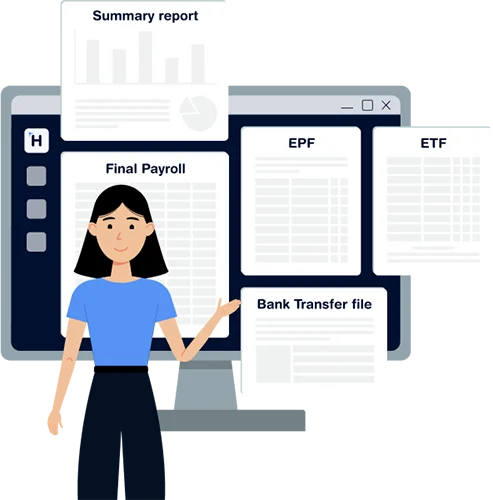Leave encashment and other laws
Sri Lankan labor laws aim to make sure adequate provisions are made for employees to rest and recuperate from their workload. Annual leaves, casual leaves and other leave provisions are made to achieve this purpose. Therefore, they are meant to be redeemed and exploited. This is why the labor department and the commissioner generally favor the use of such remaining leaves prior to the date of termination rather than encashing them into monetary form.
How your leave entitlements should be dealt with when employment is terminated is a clearly laid out section of this act.
“Where the employment of any person employed in or about the business of a shop or office is terminated, such person shall be entitled to take and shall take before the date of such termination-
- the holiday with full remuneration, if any, to which he may be entitled in respect of the year of employment preceding that in which the termination occurs; and
- in respect of the period during which he has been continuously employed in the year of employment in which the termination occurs-
- a holiday, with full remuneration, of one day in respect of each complete month, if such period is less than ten months, and
- a holiday of fourteen days with full remuneration, if such period is not less than ten months, and such employer shall allow such holiday and be liable to pay such remuneration:”
(Shop and Office Act, section 6)
When an employee is being terminated or terminated their employment with their employer (even if you quit, or you are fired), he can take the holidays he is entitled to, for the previous year.
For the current year until the date of termination, if that period is less than ten months, the employee should receive one day for every month he has completed service.
And if the period between the beginning of the year of employment (calendar year, Jan1st) to the date of termination is more than ten months, then that employee should be able to take 14 days of leave with full remuneration
Example 1 – if an employee terminates their employment on the third year of employment on July 31st, they will be awed,
- For the preceding year of employment – 14 days of Annual leave, 7 casual leave (or the remaining balance after what was already used)
- For the year of employment until the date of termination – 7 days (because 7 months were completed as of July 31st)
Example 2 – if an employee terminates their employment on the third year of employment on November 30th, they will be awed,
- For the preceding year of employment – 14 days of Annual leave, 7 casual leave (or the remaining balance after what was already used)
- For the year of employment until the date of termination – 14 days (because 11 months were completed as of July 31st, and that is over 10 months)
“Provided, however, that where such holiday cannot be allowed by reason that the period of notice of termination of employment is insufficient or the employment is terminated without notice, the employer shall pay full remuneration to such person in respect of each day on which a holiday should otherwise have been allowed.”
If there is not enough time to use the remaining holidays before the date of termination either because the notice period was too short compared to the remaining number of leaves or employment is terminated without any notice (meaning notice might be given on the same day as the date of termination), Employer should pay full remuneration for each day of the entitled leave amount.
Example 1 – Let’s imagine an employee who earns LKR 45,000 a month, resigns on July 31st in his third year of employment and gives notice on June 30th of the same year of employment, he is entitled to 28 days (about 4 weeks) in holidays.
This means the employee can stop reporting to work on the 3rd of June and enjoy his remaining leave balance for the remaining 28 days until his date of termination which is 31st. Or even use it earlier than that.
Example 2 – Let’s imagine an employee who earns LKR 45,000 a month, Let’s imagine an employee who earns LKR 45,000 a month, resigns on July 31st in his third year of employment and gives notice on July 15th of the same year of employment, he is entitled to 28 days (about 4 weeks) in holidays. He has only 16 days before his termination
This means the employee can stop reporting to work from the 16th of June onwards and enjoy 16 days of his holidays from the total entitlement of 28 days until his date of termination which is 31st.
For the remaining 12 days, he should be compensated as follows: LKR 45,000 per month divided by 30 will give you a day rate of LKR 1,500, meaning LKR 18,000 should be paid to the employee after encashment.
Some organizations prefer to encash all the remaining leaves of the employee and have the employee report to work until the date of termination. This is done with the mutual agreement between both employee and employer. Most of the time this happens when the employee is valuable to the organization and is needed to train his replacement or the team before he leaves. So, paying extra would be worth it. These are some murkey waters, so be sure that grey areas such as these are handled with care.
Navigating the landscape of leave entitlements and encashment upon termination of employment in Sri Lanka requires a nuanced understanding of labor laws and careful consideration of individual circumstances. While the law mandates the utilization of accrued leave before termination and provides guidelines for encashment in specific situations, there are gray areas that necessitate clear communication and mutual agreement between employers and employees.
It’s crucial for organizations to prioritize fairness and transparency when handling leave entitlements during the termination process. This includes honoring employees’ rights to take earned leave and providing adequate compensation for unused leave days when necessary. Additionally, mutual agreements for encashment should be approached with caution, considering the potential impact on both parties and ensuring a smooth transition for all involved.
By upholding these principles and fostering open dialogue, employers can uphold a positive work culture that values employee well-being and legal compliance. Likewise, employees can navigate termination situations confidently, knowing their rights are protected under the law and through fair practices in the workplace.



